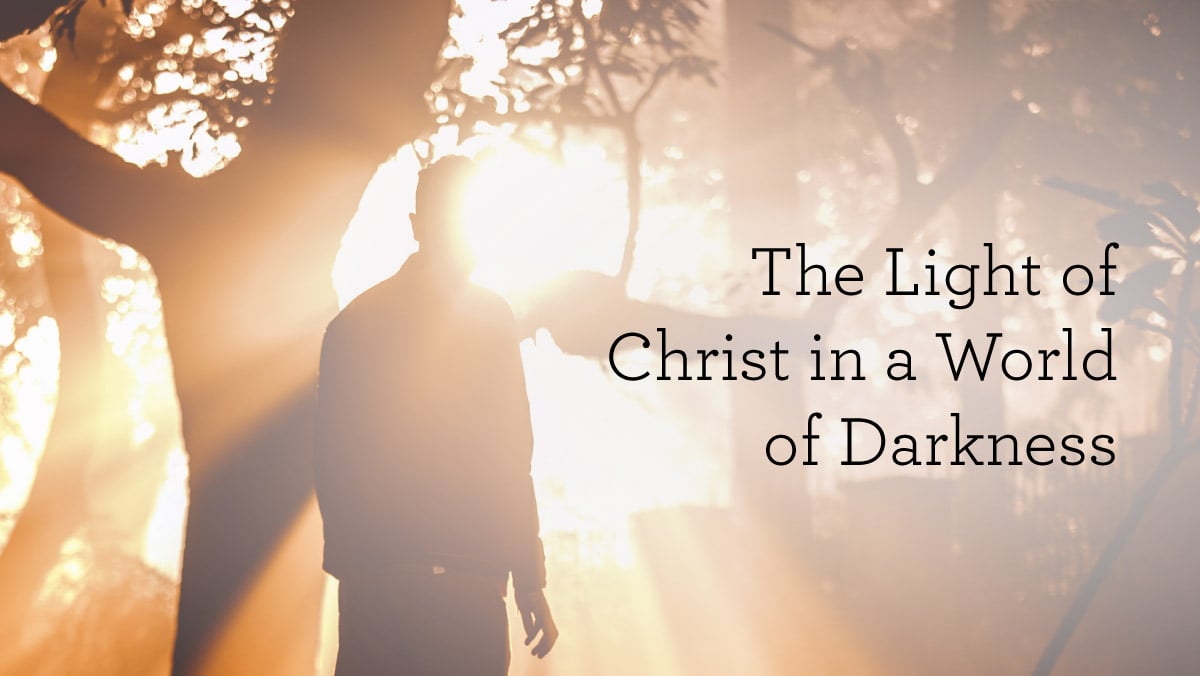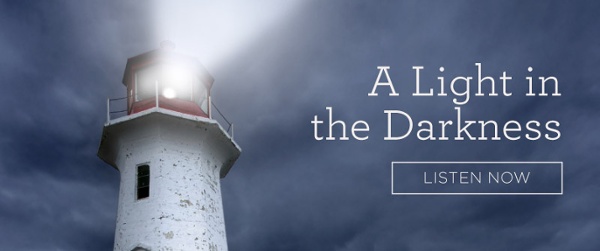Truth For Life
The Light of Christ in a World of Darkness
December 08, 20228 by Alistair Begg

In his 1939 Christmas broadcast to the British nation, King George VI read from a poem by Minnie Louise Haskins:
I said to the man who stood at the gate of the year,
I said to the man who stood at the gate of the year,
“Give me a light that I may tread safely into the unknown.”
And he replied: “Go out into the darkness and put your hand into the Hand of God.
That shall be to you better than light and safer than a known way.”1
While those words were obviously meaningful to George VI and his subjects amid an escalating war with Germany, they still find an echo in the hearts and minds of men and women today. We live in a time of great uncertainty and anxiety. Whether the context is geopolitics, the national economy, clashing worldviews, or even our own family lives, people today are treading into the darkness, looking for some light that will show them the way.
In John 3:19, in His conversation with Nicodemus, Jesus shared the good news that we celebrate during the Christmas season: “The light has come into the world.” And the nature of the light is not a philosophy. It’s not a political ideology. It’s not a sentiment or a concept. The light is a person: Jesus Christ. God, in His love, sent Jesus into the world to light our way forward, leading us out of a world of death and into life with Him.
Jesus is the light by which we can see. Or, to use Haskins’s metaphor, He is the hand of God extended to us—better than any would-be light this world might offer. How, then, can we reflect His light in a world of darkness? Let’s consider the answer Jesus Himself gives.
People Love the Darkness
“The light has come into the world, and people loved the darkness rather than the light because their works were evil. For everyone who does wicked things hates the light and does not come to the light, lest his works should be exposed.” (John 3:19–20)
Before we can understand the beauty and power of the light of Christ, we first must understand what separates His light from the darkness all around it.
It’s not normal for burglars to call out from the darkness of the yard, “Excuse me, could you turn the spotlights on? I’m trying to steal from your house!” They’re burglars. They do their work in the dark. The worst thing that can happen to them is for the lights to come on and reveal them. Similarly, the Bible says that apart from Christ, we live our lives in darkness (Eph. 5:8; 1 Peter 2:9).
The darkness of our time is revealed in many different ways, and certainly in intellectual confusion and moral perversion. When people hear Jesus say, “The light has come into the world,” many respond, “That’s very interesting, but I have my own views. I have another light that I look to, and that light is as good as any.” Some have the notion today that beliefs are valid as long as they mean something to somebody. They believe there is no objective or lasting truth; there is just whatever each individual chooses for himself or herself. And if there is no eternal truth, then neither are there moral absolutes, so we shouldn’t disagree with people for living out their “true selves”—whatever the result might be.
Unless God changes our hearts, the last thing we want is to take a hand that will lead us out of darkness and into light.
We need not even turn to the most sordid examples—racism, public malfeasance, sexual perversion, or outright violence—readily as those examples may present themselves. The fact is that our society is so accustomed to the dark that we often don’t even realize the lights are out. As C. S. Lewis wrote, great evil is often “conceived and ordered … in clean, carpeted, warmed, and well-lighted offices, by quiet men with white collars and cut fingernails and smooth-shaven cheeks who do not need to raise their voice.”2 If we are enabled to see the darkness, we will realize that it is not just present in the obviously bad things happening. It is within our own hearts. It is the natural disposition that says, “I am in charge of me.” And it is deeply rooted in everyone—even in the most “upright” people.
In the nativity story, Herod hated the idea of a king because he wanted to be on the throne. In the Gospel accounts, the Pharisees rejected the Messiah because they had their own way of securing salvation. Two thousand years later, we reject the Messiah-King for the same reason. We want to have the final word over our own lives, and so we give our love to the darkness, despite all the uncertainty and chaos it brings. Unless God changes our hearts, the last thing we want is to take a hand that will lead us out of darkness and into light.
God Must Lead Us to the Light
“But whoever does what is true comes to the light, so that it may be clearly seen that his works have been carried out in God.” (John 3:21)
If you’ve ever sat for a long time in a room reading as the day dwindles away and the sunlight fades, you may have had the experience of someone walking in and saying, “It’s so dark in here!” And you may have answered, “I didn’t notice! I was so caught up in my book.” The work of the Spirit of God is to be the one to come into our lives and say, “It’s dark in here.” By nature, we don’t realize it’s dark. By and large, we think it’s fine, because it’s all we’ve known. But it’s only after we’ve realized it’s dark that we can we reach for a light.
The Christmas message ought to be hopeful. But if it is to be hopeful, it must be more than sentimental. Hope turns on the fulcrum of truth. If we would hold on to hope as we look into the darkness of the coming year, then our own purposes for our lives will do us little good. We can make nothing true by believing it, and we can make nothing right by wanting it. If we would hold on to hope, we need to listen to the voice speaking into our hearts and saying, “It’s dark in here.” And then we must look to “the true light” who has come into the world (John 1:9).
The Christmas message ought to be hopeful. But if it is to be hopeful, it must be more than sentimental. Hope turns on the fulcrum of truth.
The world is in darkness because our default setting is no longer to live according to the true purpose of our Creator. In other words, we aren’t born with the desire “to glorify God and to enjoy Him forever.”3 But God sent His Son into the world to restore people to the truth. The eternal Word became a man and lived among us, and then He died for us, bearing the punishment for the wrong we’ve done. When He rose again, He forged a path we could follow Him on into new life with God as we live in the hope of the resurrection. And He has sent His Spirit to dwell in us, making it possible for us to walk in God’s power.
“Put Your Hand into the Hand of God”
Jesus came into the world to transform us by leading us out of the darkness of self-serving falsehood and into the light of God’s true purpose. And this demands a personal and life-transforming response: Trust Jesus Christ to secure your forgiveness with God and lead you in righteousness for His glory. Divest yourself of control over your own life, and make Him your Lord.
Jesus’ death on the cross has made forgiveness possible. By nature, we think we do not need Him. But today, if it’s as if the Spirit is speaking to you, saying, “You know what? It’s dark in here. Come and walk in the light of Christ,” do not ignore that invitation. “Put your hand into the Hand of God.” He will prove Himself to be better than the best this world has to offer.
This article was adapted from the sermon “The God Who Is There” by Alistair Begg.

Minnie Louise Haskins, “God Knows”(1912).↩︎
C. S. Lewis, preface to The Screwtape Letters (1961).↩︎
The Westminster Shorter Catechism, Q. 1.↩︎
Copyright © 2022 , Truth For Life. All rights reserved.
Unless otherwise indicated, all Scripture quotations are taken from The ESV® Bible (The Holy Bible, English Standard Version®), copyright © 2001 by Crossway, a publishing ministry of Good News Publishers. Used by permission. All rights reserved.
Home
CONNECT WITH US
PO Box 398000
Cleveland , OH 44139
Alistair Begg Daily Devotional & Program
Spurgeon Daily Devotional & Program
Weekly Program & Blog Recap from TFL
Monthly Truthlines letter from Alistair Begg
Truth For Life is the teaching ministry of Alistair Begg and is committed to teaching the Bible with clarity and relevance so that unbelievers will be converted, believers will be established, and local churches will be strengthened.
Truth For Life is a qualified 501(c)(3) tax-exempt organization.
© 1994 - 2022 Truth For Life. All Rights Reserved. Policies | Site Map
Truth For Life





0 Comments:
Post a Comment